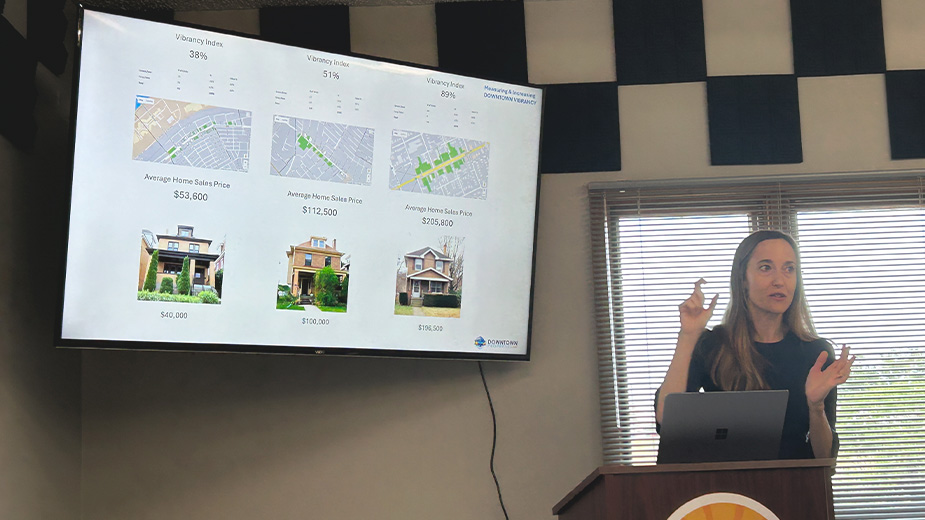Amid GM Fallout, Officials Focus on Next Steps
YOUNGSTOWN, Ohio – State and local leaders were optimistic about, or at least hadn’t foreclosed, the prospect of attracting a new product for the General Motors Lordstown Complex in the wake of Monday’s announcement that GM would end production of the Chevrolet Cruze in March.
John Minor, president and chief investment officer at JobsOhio, said he had “several calls” Sunday with GM officials regarding the coming announcement. During the discussions, the company officials said they would “idle” and not “close” the plant, he reported.
“We will continue to engage GM to discuss alternatives for this plant and for Lordstown,” Minor said. “They do not know what they’re going to do. That’s the message that we heard. They will have some decisions in terms of what to do with the facility long term, and we’re going to continue to push them and explore different alternatives and various options.”
During the conversation, Minor said he and the GM officials discussed the “economic reality” and “macro and industry challenges” facing the auto sector as demand for cars and sedans declines in favor of SUVs, trucks and crossovers.
“Not withstanding that, it’s still disappointing that GM will stop production of the Cruze in March,” Minor said.
Jim Graham, one of the UAW leaders of the effort 20 years ago to preserve jobs at the plant, is confident that the right leadership is in place today to again secure a new product for Lordstown. In late 1998, when labor leaders and the Youngstown/Warren Regional Chamber launched the Bring It Home campaign, the Lordstown plant was six months from closing, said Graham, former president of United Auto Workers Local 1112.
“There is a chance [to get a new product]. There is always a chance. But right now the leaders have to lead, and not just talk about it at a meeting and get on TV,” Graham said Monday.
Graham now serves as president of Warren City Council. He expressed “the utmost faith” in Local 1112 President Dave Green, shop chairman Dan Morgan and other union leaders.
Graham said he spoke with Green Monday after the news broke, and advised the Local 1112 president to go to Detroit to meet with GM’s management, as union leaders did 20 years earlier. Following those meetings, the complex’s two labor unions at the time – UAW Local 1714 represented fabricating plant workers until the two unions merged under the 1112 banner earlier this year – approved a shelf agreement that eventually led to GM manufacturing the Chevrolet Cobalt at Lordstown.
“Now is the time to get an agreement together that will get us a new product,” Graham said. Union leaders need to enlist state and local elected officials in the effort, and to reassure people that leadership is working on this, he said.
Graham had harsh words for those eager to bash GM as greedy as U.S. Sen Sherrod Brown did in a statement.
“It’s a business to them. We have to show them that we want a new product,” he said. “People put out a quality product for years and put their heart and soul in that product. I think GM knows that.”
On the other hand, the former UAW official had harsh words for President Donald Trump and his apparent inaction in the matter.
This summer, Brown, D-Ohio, asked Trump to speak directly to General Motors CEO Mary Barra about the Lordstown plant but the president was “noncommittal,” the senator said.
“Based on the fact that Trump won this area, he should be totally involved in this thing,” Graham said. “From what I understand, he has yet to return phone calls to anybody. That’s not the right way to do things.”
Trump told The Wall Street Journal Monday that he had spoken with GM’s CEO, Mary Barra, Sunday night and urged her to open a plant in Ohio to replace the one ending production.
“I have no doubt that in a not too distant future they’ll put something else. They better put something else in,” Trump warned Monday as he departed the White House for a campaign stop in Mississippi.
So far, GM has not identified any obstacles to putting a new product at the plant or specific incentives to encourage the company to reinvest in the plant, Minor said. JobsOhio also is working with its various local and regional partners to create job opportunities for Ohioans.
The Ohio Department of Job and Family Services has set up a station at the Local 1112 hall, reported Kristi Tanner, senior managing director of automotive for JobsOhio.
“Many companies are looking for good talent,” and the state employment agency is set up there to “help those workers interested in looking at other opportunities,” she said.
“This is still disappointing. It’s frustrating when these announcements happen,” Minor said. “That’s why we’re looking to step up efforts to find additional opportunities for this part of the state.”
Meanwhile, the Youngstown/Warren Regional Chamber will continue its efforts to attract, retain and expand businesses in the Mahoning Valley, said James Dignan, president and CEO. GM is the Mahoning Valley’s fourth-largest employer. “You can never replace that one-for-one, but we want to make sure we’re ready for what’s next,” he said.
Dignan emphasized that the recently launched Drive It Home campaign is still alive, and noted that GM’s phrasing surrounding the plant characterizes it as a “unallocation” of a product for the plant rather than a permanent closure.
The chamber’s role is to make sure GM has the information it needs to make an informed decision, he said. “We want GM to know we’re ready to be a partner in whatever they’ve got in mind,” he said.
Sherris Moreira, executive director of the Shenango Valley Chamber of Commerce, said she reached out to Dignan as soon as she heard the news to work with the Regional Chamber to create a regional roundtable for problem-solving and to help displaced GM employees find work.
“This is a problem that is beyond a border,” she said.
Throughout the day, local leaders and area and regional economists assessed the impact of Monday’s announcement.
“It’s going to be a body blow for the Youngstown area economy,” said Bill Adams, senior economist with PNC Bank.
The job loss for workers at GM Lordstown and its suppliers probably represents a 1% reduction in the 216,000-person workforce in the Youngstown-Warren metropolitan statistical area, he said. Further, he said, those jobs pay higher than average wages than others.
“The loss of those jobs will be easier for the region to get through than if it had taken place five or 10 years earlier because the job market in Ohio and generally is “quite tight,” he said.
“There are companies who are hiring in the state,” he said. “What that means is that either people will have to move in state to find another job or they’ll be looking at much longer commutes to get to work.”
A.J. Sumell, an economics professor at Youngstown State University, said he has been concerned about the plant’s fate for about two years, ever since GM cut the first of the plant’s three shifts.
Sumell acknowledged he was surprised the company would announce the closing just before the holidays because of the public relations factor. He surmised the move probably had been discussed for some time and decided to delay it until after the midterm elections so it didn’t appear to be a political maneuver.
“It’s a matter of, ‘Well, there’s no good time to make the announcement. So now is as good a time as any,’ ” Sumell said.
The 1,500 or so direct jobs tied to the plant might not seem like much in terms of impact on the overall economy, although it will be much greater on the Lordstown community. The broader concern is the multiplier effect and how that will affect the jobs that are dependent on the plant, he affirmed.
Warren Mayor Doug Franklin called the news devastating. Although he could not estimate how much income tax money the city might lose from plant workers and employees at suppliers, the shutdown would cost the city $500,000 annually in water sales to Lordstown, which then sells it to the plant.
“We’ll do out best to support those workers, particularly in Warren but all over this area,” Franklin said.
Youngstown Mayor Jamael Tito Brown similarly characterized the decision as a “devastating blow” to the local economy, and expressed his commitment to helping displaced GM workers.
“This is another catastrophic hit to our local economy,” the mayor said.
Brown said he would be speaking to Sen. Brown and that U.S. Sen. Rob Portman, R-Ohio, had reached out to him as well. Like Franklin, he is unsure how many workers affected by the shutdown live in the city.
Although obviously bad news for the region, Sumell doesn’t expect the announcement to have a major impact on local morale, given the “economic devastation” the community already has dealt with since the decline of the steel industry 40 years ago.
“You don’t have to be an economist to know that it’s really bad. But there’s almost a sense of resilience that’s built into the fabric of the entire community over the past four decades,” the YSU economist said. “Because of that resiliency, there is no doubt that we will survive.”
COMPREHENSIVE COVERAGE:
GM to Close Lordstown Plant In March
Inside Union Hall, GM Announcement ‘A shot in the Gut’
Amid GM Fallout, Leaders Focus on Next Steps
Workers Face Uncertainty After GM Decision
Chevy Dealers Not Surprised by Cruze Cancellation
Brown Calls GM Decision ‘Corporate Greed’
Ryan on Plant Closing: ‘New Black Monday’
Read Full Text of GM Closings Announcement
Ryan Wants Congressional Hearing on GM Tax Windfall
WATCH VIDEO:
Leaders React to Lordstown Closing
‘3 Minutes With’ Greg Greenwood, Chevrolet dealer
Copyright 2024 The Business Journal, Youngstown, Ohio.



